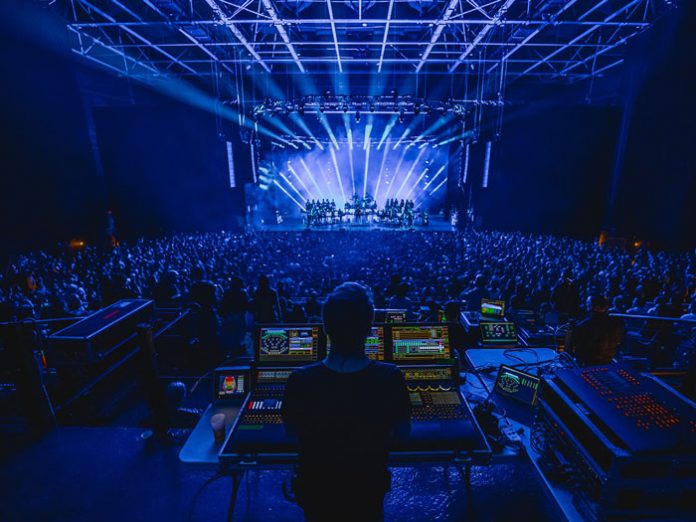Worakls is renowned for his melodic and experimental sounds. He toured his latest Orchestra album throughout 2019 to a series of 1000-1500 capacity venues and concluded the year by stepping up to three arena-sized shows – Zeniths in Paris and Toulouse and the Salle 3000 concert hall at the Lyon Palais des Congrès – complete a with a 31-piece orchestra.
To light these larger shows plus some additional European dates scheduled for early 2020, lighting designer Nicolas Galloux was asked on board.
Nicolas specified around 80 Robe moving lights to assist him in the task, including MegaPointes, BMFL Blades, Spiiders and LEDBeam 150s, all supplied by French rental company S Group who also provided the audio.
S Group’s technical director Nicolas Cantier was instrumental in getting Nicolas G involved with lighting these important shows, on which he worked closely with the artist to evolve the appropriate ambience and mood.
They made the decision that lighting should be the primary visual medium, so no video meant Nicolas was under a lot of pressure to accomplish all the desired effects and ramp up the overall emotional impact of the performance.
“With Worakls’ intricate music and all the depth and richness brought by the orchestra, I knew that with the right fixtures, I could achieve everything needed with lighting,” he explained.
The design and physical placement of the fixtures included a more structural and architectural approach.
With so many people onstage – Worakls was downstage centre surrounded by the orchestra on risers – Nicolas wanted to be able to shift attention to different parts of the stage and pick out individuals or groups of musicians at specific times to coincide exactly with accents and emphases in the music.
The 19 BMFL Blades were all positioned on the overhead (triangular stacking) trusses and used for key lighting and specials as well as for big, dramatic beamy looks.
Nicolas chose the BMFL Blades for their power and accurate shuttering. “The BMFL is a reference fixture for Zenith-sized shows,” he commented. He needed the shuttering to highlight different musicians and areas onstage, and a light that would contrast and interact with the row of 14 MegaPointes positioned upstage on the floor.
He made the most of the BMFL Blade’s two gobo wheels and animation wheel to produce a diversity of different looks.
The MegaPointes were used for big bold aerial effects and colourful crescendos as well as for silhouetting and blow-through outlining the orchestra sharply in their beams. They were also used for more subtle backlighting effects on the musicians as they solo’d.
The 32 Spiiders were rigged on six vertical truss sections at the back offering an ideal position for general stage washing from more provocative angles. Nicolas used the individual ring control for some interesting effects. Sometimes just the central Spiider LED was used to give the impression of multiple single-pixel luminaires all over the stage matching in with the look of the LEDBeam 150s ensconced in the orchestra.
At other moments Nicolas added the exterior rings of LED which completely changed the character of the light source and pushed the Spiider to its full power.
The LEDBeam 150s were rigged in amongst the orchestra on the floor, making a great impact for a small fixture in a large venue. They were easily small and light enough to be concealed in amongst the musicians without bothering them.
Nicolas ran the lighting from a grandMA3 full-size console with a mix of manual and timecoded operation.
Nicolas, a freelance lighting designer has been using Robe products in his work for some time. In fact, the very first Robe moving light he used was the ColorSpot 250 in the mid-noughties, and then he started specifying Robe more regularly after the Pointe was launched in 2013.
His general impression of the brand right now is that Robe “is a market-leading brand with many high-profile references that have become a go-to choice for leading lighting practitioners worldwide”.
These three Worakls Zenith shows in France were promoted by Dancecode and were all sold out. The production manager was Gabriel Audrin and the equipment was coordinated for S Group by Anthony Picard.





